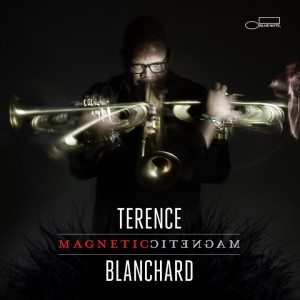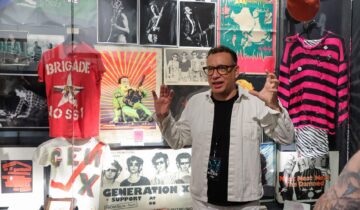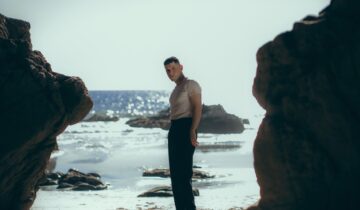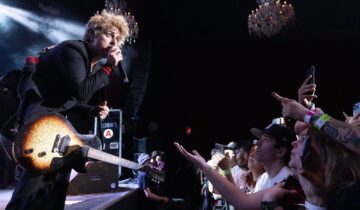 For SF WEEKLY: Terence Blanchard plays his trumpet like a seasoned athlete: his shoulders expand and rotate before big, loud bursts of high notes; he leans back and holds his horn up high for moments of majesty; when subtlety is called for, he bends at the waist and knees and creeps forward and backward with his horn pointed low.
For SF WEEKLY: Terence Blanchard plays his trumpet like a seasoned athlete: his shoulders expand and rotate before big, loud bursts of high notes; he leans back and holds his horn up high for moments of majesty; when subtlety is called for, he bends at the waist and knees and creeps forward and backward with his horn pointed low.
Perhaps known best for his Spike Lee film compositions, Blanchard in live performance is powerful. He blows through the trumpet’s upper register with force and clarity, and never falters. He bends notes so slowly and with such precision that the sounds seem to drip and ooze out of the bell of the horn. Blanchard is also funny: in-between songs, at a slow, New Orleans pace, he tells stories about bandmates, and each one has a punchline.
Blanchard, a five-time Grammy winner, opened SFJAZZ’s second season Thursday night with two sets of original material from his 2013 Blue Note release, Magnetic. Unfazed by the noticeable amount of empty seats, he earned two standing ovations. He congratulated SFJAZZ on its new digs, which opened in January: “I’m from the home of jazz, and we don’t have anything like this,” he said to the crowd. “I’m gonna write my congressman tomorrow.”
Benin-born guitarist Lionel Loueke and saxophonist Ravi Coltrane joined Blanchard onstage as featured guests for several songs, while Cuban pianist Fabian Almazan, 21-year-old Los Angeles bassist Joshua Crumbly, Oakland-raised drummer Justin Brown, and Tucson-based tenor saxophonist Brice Winston served as Blanchard’s band for the night. Dressed casually with no ties and shirts mostly un-tucked, the band’s energy ebbed and flowed with the mood of each tune.
Brown hadn’t rehearsed with the band before the gig, but played through both sets as if he knew exactly where he wanted each song to go; he and bassist Crumbly playfully kicked rhythms and tempos back and forth. Almazan, occasionally reaching for an electronic keyboard, transitioned a few songs with solo piano interludes that hushed the crowd. Winston phrased solos like he was speaking at a podium: eloquent and precise. Loueke, aided by effects pedals, plucked and strummed his way through solos that injected songs with a strong West African influence. Coltrane, who has an air of shyness onstage, blew solos on both soprano and tenor saxophone that were stirring: flurries of fast, escalating notes showered down on sustained tones and created moments of brilliance. Playing on just two songs, Coltrane certainly could have been utilized more.
Many of the group’s songs were up-tempo in the vein of bop, but one song in the first set had an eerie, Ethiopian jazz sound. A long ballad in the second set felt overly drawn out and dramatic but got the crowd on its feet in the end. Blanchard played through an effects pedal all night, which added delay and reverb to his sound. Loud, high notes echoed through the hall as did his airy, lower-register trills. Mostly the effects added excitement and texture, but since the pedals were rarely if ever turned off, there were no unfiltered sounds to compare it to.
Speaking to the crowd in-between songs, Blanchard spoke about how complicated and sophisticated jazz can be to play. In an attempt to describe jazz, borrowed an anecdote he heard in an interview with Art Blakey: “For me, the word ‘Jazz’ means, ‘I dare you’.” Then he looked around at the young talent surrounding him onstage and said, “For the longest time, I thought this was my band. But these guys are like, ‘we dare ya.'”
Blanchard and his ensemble play again tonight, Saturday, and Sunday.



